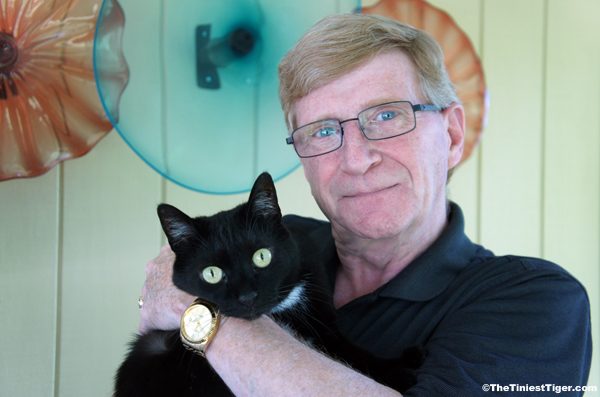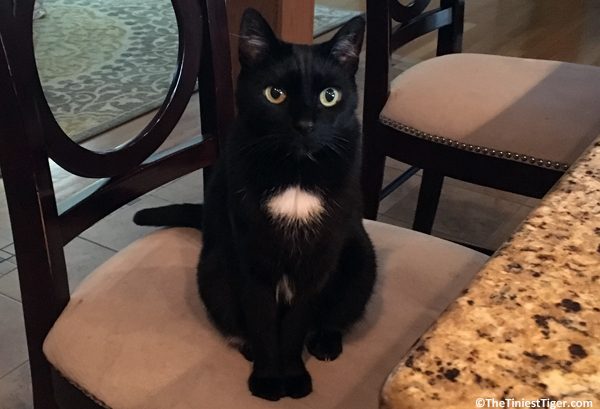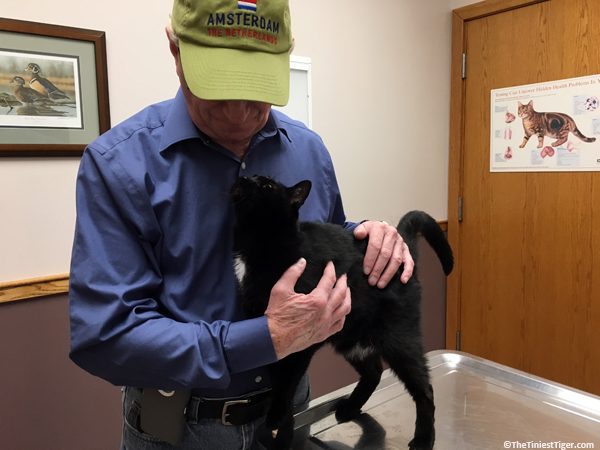
Paul and Mercy
Mercy’s Heart is Holding Steady
Last week Mercy had his followup echocardiogram to see if there are any changes in his heart. Mercy showed early signs of hypertrophic cardiomyopathy (HCM) last August. We were relieved to learn that there has been no progression of the disease. Mercy is prescribed to take atenolol. Atenolol is a beta-blocker that affects the blood flow through arteries and veins and is used to treat chest pain and high blood pressure. Mercy was prescribed to take a 1/4 pill every 12 hours. Dr. Guinan thought since we caught this early, there was a better chance the atenolol would help Mercy and might even keep the condition from worsening. So far so good.
Now, about that 1/4 pill every 12 hours. This did not work out as we would have liked. Mercy was not a happy boy and because we didn’t want to impose more stress on him twice every day, Dr. Guinan, called in a prescription for his atenolol in liquid form that we can give to Mercy with a dropper twice per day. We added natural chicken flavor to make it more palatable for Mercy. I can’t say that Mercy is a big fan of receiving his medicine, but it is much easier on him and us to give him the liquid twice per day. There is also a transdermal gel that we can use on the inside of his ear. Mercy’s doctor prefers the liquid atenolol so that is what we are using almost all the time. We do have the transdermal gel to use once in a while. Ask your veterinarian what is the best medicine for your cats.

Don’t ask me about my medicine.
How We Learned Mercy Has HCM
I am going to repeat some of what we have already discussed about HCM because it is so important.
Last August when we took Annie, Eddie and Mercy in for their wellness exams, we asked our veterinarians to run the IDEXX SDMA test for Mercy. He was 10 years old and we wanted to get an idea of his kidney function as well as how he is doing overall. We had the test run and the results were not at all what we were expecting! Mercy’s kidney health is perfect and in fact quite remarkable for a 10 year old cat. But what the test also showed is an abnormal Cardiopet proBNP. Mercy’s results show on the low side of high but enough to cause concern. NT-proBNP concentration is compatible with increased stretch and stress on the myocardium. To understand better and get a more accurate understanding of cardiac structure and function, echocardiography is recommended.
What Is Hypertrophic Cardiomyopathy (HCM)
Mercy’s echocardiogram showed an early stage of hypertrophic cardiomyopathy (HCM). HCM is the most common heart disease in cats. The condition results in hypertrophy or thickening of the heart muscle which, in time, creates increased stiffness of the heart walls (muscle) resulting in poor cardiac function during the relaxation phase of the cardiac cycle (diastole). As this condition worsens, the thickened heart muscle can cause obstruction to blood flow leaving the heart via the aorta increasing the effort needed to pump blood out of the heart during the contraction phase of the cardiac cycle (systole).

Mercy looking for comfort from Paul
What Causes HCM
HCM is thought to be an inherited disorder caused by a genetic mutation of the genes that control heart muscle growth. The HCM mutation has been determined in the Maine Coon and Rag Doll breeds but the genetic defect has not been identified in other purebred or domestic types of cats. In humans, more than one genetic mutation has been identified as causing HCM so it is likely to be true for cats as well.
Symptoms of HCM
The symptoms of HCM vary depending on the degree of severity and perhaps on the different genetic mutations in individual cats. Cats are most often diagnosed when they have no symptoms but when a veterinarian detects a heart murmur or an irregular heart beat during a wellness exam. When symptoms arise, they may include signs of congestive heart failure.
- Increased respiratory rate
- Labored breathing
- Shortness of breath
- Lethargy
- Appetite loss
- Change in behavior like hiding
- Sudden loss of one or more legs due to blood clots obstructing blood flow
- Fainting spells from an irregular heart rhythm
- Stroke
- Acute sudden death may occur without any symptoms.
Treatment of HCM
The treatment for cats with HCM vary with the severity of the condition at the time of detection. Current medications include drugs that slow the heart rate and improve relaxation of the heart (beta blockers or calcium channel blockers), drugs that thin the blood to prevent blood clots from forming (platelet inhibitors, anticoagulants), and diuretics to control abnormal fluid buildup. Your veterinarian will determine the best treatment based on your cat’s condition.

Mercy happy and healthy daydreaming with Bad Kitty
Wellness Exams are So Important
I know I keep repeating this, but If we had not taken Mercy in for his wellness exam and asked for the IDEXX SDMA panel, we would not have known he was experiencing these health issues. Please take your cats in for their check ups and if your cat is getting a little older, think about running the IDEXX SDMA panel to check their wellness.
Thank you for all the kind words and prayers for Mercy.